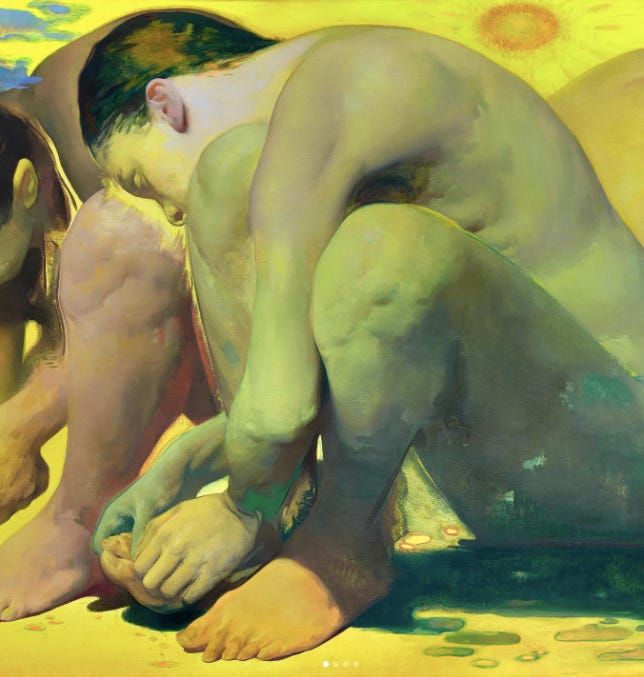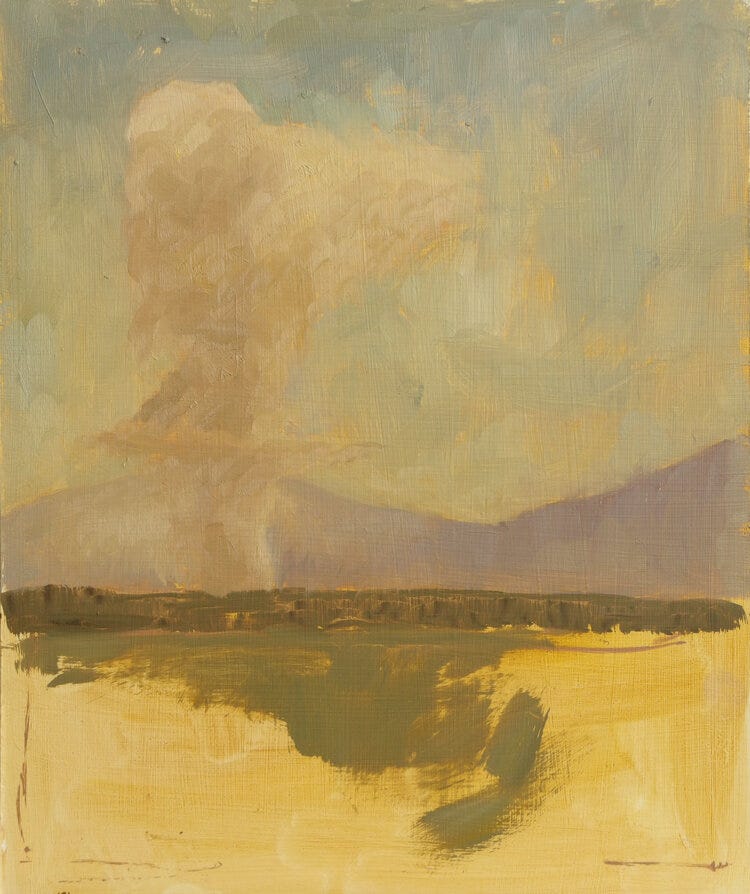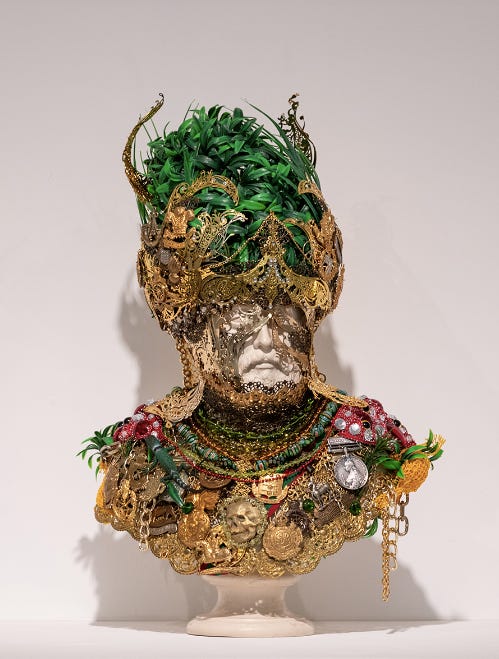Interesting Times No. 20
Barbara Ehrenreich; an ailing pig; The Theatre of Shame; going Flatlife; mental illness; Mensa; Brad Pitt, artist; mythological monsters; Hilary Mantel; self-censorship; before Tinder
Hello folks. Sorry for the delay in getting the newsletter out, and welcome to new subscribers.
Reason for delay: I got sick of the internet. The endless loops of the same opinions; the mockery of differing opinions; the ‘everything is newer and more interesting than yesterday’ treadmill; the ‘this thing happened - you must have THOUGHTS on it’ vibe of it all. How tiring. How dull.
Anyway, we’re back on, trying to ignore all that’s mentioned above, and the links are wired (?) up to provide some of the high and low, old and new of the www. I hope you find something to enjoy.

JOURNALISM
‘Brad Pitt has entered his 'fuck it, we’re all going to die anyway' style phase.’ Also, Brad is an artist now! He has a show with Nick Cave and Thomas Houseago, and a critic has spoken ! ! Jonathan Jones, art critic, has declared Brad ‘a very fine sculptor’. Goodness.
Sophie Heawood, journalist and author, has an excellent Substack (subscribe!), and here is her very enjoyable Rightmove Roundup edition (for NZers, Rightmove is equivalent to Trade Me Property). It’s fun and witty, and the houses are delicious and I don’t feel any house envy at all, not at all, so that’s good.
An essay by E. B. White, published in 1948: ‘I spent several days and nights in mid-September with an ailing pig and I feel driven to account for this stretch of time, more particularly since the pig died at last, and I lived, and things might easily have gone the other way round and none left to do the accounting.’
‘Because shaming targets the whole person, rather than a specific act, it favors the flatness of stereotype over the complexity of the real.’ The ‘Theatre of Shame.’
A fascinating piece on how counterintuitive making the ‘right’ choices for the planet can feel: ‘An environmentalist gets lunch.’ Spoiler: it doesn’t really involve buying local produce, and often includes a microwave.
‘Workers in China are tired of 9-9-6, the 9 a.m. to 9 p.m. six-day workweek, and are instead deciding to lie flat: 躺平, tǎng píng.’ The ‘Diary of an Attempted Flatlife.’
‘Across Britain, people have fallen prey to the delusion that the Queen was IRL besties with a talking bear. Shortly after the news of her death was announced, a cutesy illustration went viral: alongside the caption “I’ve done with my duties, please take me to my husband”, Paddington was positioned as the Grim Reaper escorting Her Majesty to the great beyond. From that point on, the bear became the defining symbol of our national mourning to increasingly absurd effect.’
From 2005: ‘Las Vegas is a city built by breakfast specials. Sex and gambling, too, of course, and divorce and vaudeville and the creative use of neon. But the energy for all that vice had to come from somewhere, and mostly it came from eggs. How breakfast gets served at the Flamingo hotel.’
‘Jane Bown: A Life in Photography - in pictures. Her first commission for the Observer was a portrait of philosopher Bertrand Russell in 1949. From then, Bown photographed the great and the good, the rich and the poor, the ordinary and extraordinary with a compassionate and gentle eye.’

The last bit of the byline below is one of the most enjoyable and ridiculous things I’ve ever read. It’s from a 1988 piece in Vanity Fair written by the ultimate showbizzzz insider, Dominick Dunne: ‘Hollywood sisters Jackie and Joan Collins are the ultimate triumph of the immigrant. They landed from London and carved out separate kingdoms of glitz. Jackie was the Queen of Dish and Joan was the Queen of Soap. Then Soap dished.’
‘“Plume of Steam”: Jessica Douglas ruminates on the under-appreciated paintings of Barbara Tuck.’
A thoughtful and interesting piece; I recommend it, regardless of your stance on monarchy. ‘Can the nation survive Elizabeth? Monarchy offers the human psyche something it needs: Humans remain human, and it is easy enough for national feeling to shade into xenophobic triumphalism. Personally, I’ve long found myself in the uncomfortable position of valuing nations but mostly being repelled by nationalism.’
Journalist and national treasure John Campbell has written a beautiful piece on how he ‘didn’t know what I didn’t know, until I began discovering it’, and his gradual awakening to Aotearoa New Zealand’s story: ‘I have been a slow, dull student of our history.’

It’s Mental Health Awareness week here in Aotearoa New Zealand, and I have to say that despite putting up a display to mark it every year I worked at the library (bar a lockdown year I think?), I do have very mixed feelings about the whole concept. Who’s it for exactly? I don’t really know, although I do have THOUGHTS. But let’s not go there, because we don’t have all day. Here, though, are some pieces related to mental illness/distress/minds that have tried hard to adapt to what has come before. (I will however rant that there is no mindfulness app in the world that can treat particular kinds of psychic pain, or alleviate the psychological distress caused by the inequality (and subsequent poverty and powerlessness) that exists for many people in our society, and it is insulting that our culture seems to suggest so. I had a wonderful psychiatrist who wryly and wisely made fun of the whole ‘self-care’ thing by saying, ‘I mean how many soothing hot baths can one person take in a day?’ Indeed.)
‘“Refusal is the last recourse of the powerless”. Marina Benjamin on her years of no eating, and not growing.’
‘The parentified child: When parents cast a child into the role of mediator, friend and carer, the wounds are profound. But recovery is possible.’
‘Finding a way back from suicide. […] I’d written about my mother, a memoir of our lives together. She was a terrible alcoholic. The manuscript felt like a betrayal. It was April, 2006. I was sick with suicide.’ (I included this piece in an earlier newsletter, but I’m going to include it again, because, as I said back then, it brought me to my knees. How does one write about psychological suffering? I don’t think many can, and that’s not a slight on those who’ve tried, rather I think it’s just something there are so few words for. And yet the author of this piece manages to find the right ones.)

‘The creation diary of a most extraordinary dwelling: Gloria of Greymouth.’
‘Early in [her book] Nickel and Dimed, the great Barbara Ehrenreich offered up a blunt observation. “There are no secret economies that nourish the poor; on the contrary, there are a host of special costs,” she wrote. “If you can’t put up the two months’ rent you need to secure an apartment, you end up paying through the nose for a room by the week,” she explained. “If you have only a room, with a hot plate at best, you can’t save by cooking up huge lentil stews that can be frozen for the week ahead. You eat fast food or the hot dogs and Styrofoam cups of soup that can be microwaved in a convenience store.” For the poor this is no revelation, merely a description of daily life. For many others, though, it was something else, a glimpse into a world that could feel distant. Yet it was not so far away, as she understood: The poor were all around. They worked, they loved, they tried to make do. The poor carried America on their backs and debunked its self-mythologies. So, too, did Ehrenreich, who showed no patience for pretense. She always looked for the truth of a thing, and for decades, she shared her search with all of us.’ Ehrenreich’s book Nickel and Dimed about the realities of the working poor was, if this isn’t too grandiose, a political awakening for me. It was published in 2001, I was 19, and she opened my eyes. As New York Magazine says, ‘She knew there was a fight.’
‘My Week With America’s Smartest* People.’ ‘[D]uring this year’s Mensa Annual Gathering, I sat at a table with a woman named Kimberly Bakke, a 30-year-old purple-haired pastry chef and teacher from Las Vegas. Bakke is basically Mensa royalty. A 1996 Orange County Register article about her admission to the high-IQ club revealed that she was conceived at a Mensa convention, and she hasn’t missed one since; she became a member when she was three. “I have a big brain,” she told the Register reporter[.]’
My favourite thing: an insight into the politics, personality clashes, dramas etc (aka gossip) at the heart of all the little groups, professional and personal, we all belong to. ‘Who hates who in London’s culinary scene? Ed Cumming speaks to the food writers who can't stand the sight of each other.’
BRITISH GOOP OF THE WEEK:
(Fun fact: when I was 10 my family moved to England, and I obviously didn’t quite understand the vibe of the British tabloid. One day I saw one that had the whole front page dedicated to a (to use a Daily Mail phrase) ‘woman with ample assets’ and the headline ‘I GAVE BIRTH TO A GOAT.’ It shook my naive little mind to its core, and my mum had to explain the nature of the tabloid to me.)
BOOKS
‘Why So Many Mythological Monsters Are Female: A new collection of essays considers how the villainous women of classical antiquity resonate in contemporary Western society.’
On The Secret History: ‘In 1992, Donna Tartt’s debut novel became an instant bestseller; as it celebrates a 30th anniversary reissue, it remains as feverishly beloved as ever. This is the story of how a modern classic was made.’
‘15 New Books Coming in October: A deeply reported history of Covid-19; Maggie Haberman’s look at Donald J. Trump; stories by George Saunders, Alan Moore and Samanta Schweblin; and more.’
‘Early Science Fiction in Europe’s “Age of Discovery”’. Considered by many one of the founding texts of the science fiction genre, The Blazing World — via a dizzy mix of animal-human hybrids, Immaterial Spirits, and burning foes — tells of a woman’s absolute rule as Empress over a parallel planet. Emily Lord Fransee reflects on what the book and its author Margaret Cavendish (one of the first women to publish using her own name) can teach us about empire, gender, and imagination in the 17th century.’
‘The Sublime Danielle Steel: For the Love of Supermarket Schlock.’
‘One of the finest writers in English ever to live, Hilary Mantel, has died. If Britain were as grateful for her as it ought to be, there would be another funeral next week, as magnificent as the one for the Queen this week, though it would be attended by different people because Mantel could be rude about royalty. There are not many writers who, like prophets, seize, melt down, and reshape the archetypal stories of their people: Hilary Mantel’s Life with Ghosts.’
The London Review of Books, who Mantel wrote for extensively over many years, has made her writing available for non-subscribers (I’m not sure how long for, but get involved, because The LRB tends not to give a single article away for free!) And here, via The LRB, is Mantel’s speech, Royal Bodies, which caused a bit of a furore when she gave it in 2013.
‘Lit Hub’s Most Anticipated Books of 2022, Part Two. (There are 230 of them, so if there’s not even one that appeals, well…)

PODCASTS
Pandora Sykes (who co-hosted the funny, informative, delightful podcast The High Low (RIP) with Dolly Alderton) has released Season 3 of her new-ish podcast, Doing It Right, a follow on from her book How Do We Know We’re Doing it Right? (recommend). So far the new episodes have covered the myth of good skin, dementia, gendered emotion, knife crime, and fast fashion, with guests discussing these topics/ideas with Sykes, who has an admirably questioning mind. Get involved!
‘Why is it that we find stories of crime, wrongdoing and revenge so fascinating? The Ethics of Writing Crime.’
Hidden Brain: ‘We all self-censor at times. We keep quiet at dinner with our in-laws, or nod passively in a work meeting. But what happens when we take this deception a step further, and pretend to believe the opposite of what we feel? In a favourite episode from 2020, economist and political scientist Timur Kuran explains how our personal, professional and political lives are shaped by the fear of what other people think.’
See you next time,
~ Ellie





I loved your opening paragraph describing the internet. Succinctly put. Thanks